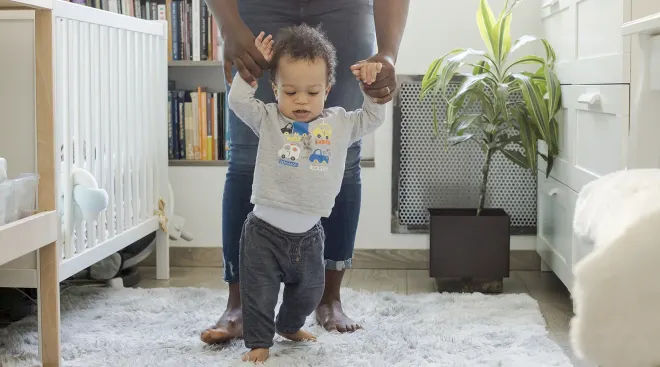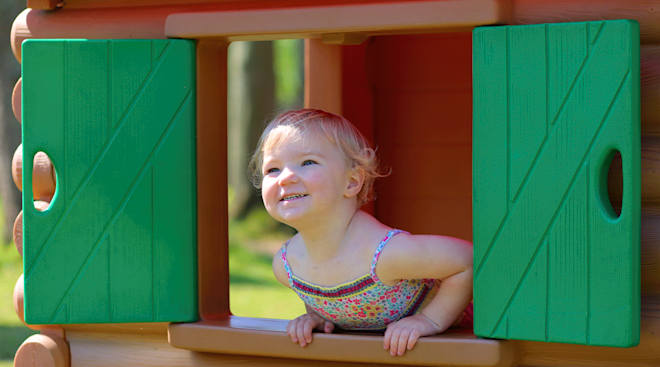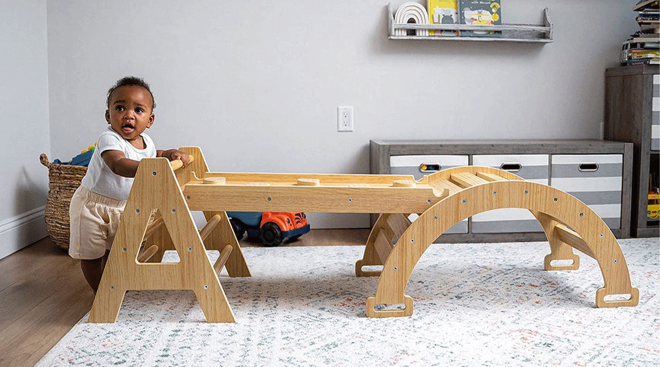What Baby's First Day Home Is Really Like
In the old days, the first few days at the hospital with a newborn might have felt like a mini vacation, except you didn’t realize it at the time: Nurses took care of your needs, someone brought you food, you could sleep and a lactation consultant was a call button away. Two to four days later, assuming it was an uncomplicated birth, homecoming was a mash-up of emotions, sleep exhaustion and, possibly, minor chaos. But these days (especially since the pandemic) that homecoming may be happening sooner for new moms. To help you better prepare, here’s what you need to know about what’s in store on Day 1 for you and your newly expanded family.
Just a few days old, baby is trying to adjust to life outside your womb—which is a big job! Expect them to be doing a lot of eating, pooping, peeing, sleeping and crying on that first day home.
Eating
Newborns, whose stomachs are about the size of a Ping-Pong ball, feed every two to four hours for a total of eight to 12 sessions a day. Don’t feel as if you have to stick to a schedule right away. Instead, if you’re breastfeeding, try to breastfeed on demand. “Breastfeeding meets so many needs—warmth, the need to suck, skin-to-skin contact, the desire to be held,” says Leigh Anne O’Connor, IBCLC, LCCE, an international board certified lactation consultant in New York City. “All those things are satisfied at the breast.”
If you need a break but baby seems glued to your nipple, try this trick: Offer baby your pinkie facing up, and tickle their palate gently. “A baby has been sucking nonstop in the womb, and now all of a sudden there’s nothing to suck,” Cathryn Tobin, MD, a Canada-based pediatrician and midwife with over 30 years of experience. Using your finger in place of a pacifier is a good idea until baby is gaining weight and feedings are established. (Just be sure to be mindful of any sharp nails!)
Don’t be worried if baby spits up. Spit-up is typically dictated by how much extra air baby takes in during a feeding. They probably won’t spit up every time, and when they do it’s usually just a dribble. “The amount is typically less than a tablespoon,” says Tobin.
Pooping and peeing
By now, meconium, the tarlike goop that appears in the first day or two of life, should be replaced by greenish transitional poop that will eventually turn yellowish, possibly speckled with little “seeds.” Look for a minimum of three to six wet diapers a day.
Sleeping
“When a baby comes home, they’re incredibly tired,” says Helen Moon, a certified lactation educator and baby specialist in the US and UK with over 25 years of experience. “The trip will be strenuous. It may be the first time the baby is exposed to fresh air, the cold, the heat of the sun, the outside world. So a simple drive will give you a very sleepy baby.” Count on baby conking out shortly after walking through the door.
“Grace slept in my arms for hours the afternoon we got home,” says Sarah S., mom to a 7-month-old girl. “She has never liked the car seat, starting with her ride home from the hospital. She (and I) cried the whole 10 minutes. By the time we arrived, her face was red as a tomato and she was exhausted.”
Expect baby to sleep between two and three hours in one stretch. If they sleep longer, you need to wake them up so they can eat. “Their tummies are so little that they can’t drink very much milk at one time,” Moon says. If baby’s left to sleep for longer than three hours, “they might become too lethargic and then will be unable to eat enough.”
Encourage awake time during the day—about an hour between naps—to shift baby’s schedule. Otherwise, they’ll be awake during the night, since they had been used to the sleep-inducing rocking of your uterus during the day and tended to be more alert in the evening, Moon says.
Crying (and other noises)
Crying is how babies communicate their needs, whether it’s hunger, discomfort, crankiness or the desire to suck. Once the need is satisfied, your little one should calm down. When holding and rocking baby doesn’t seem to work, Tobin suggests cupping baby’s head in your hands, lifting their head slightly and talking to them quietly. “Most babies will stop crying, as they are trying to hear you. They’ll also open their eyes and look at you.” If baby is wailing no matter what you do, call your pediatrician.
Other than crying, baby might be making grunting sounds. “I remember being worried about my baby snorting,” says Jill S., mom to 5- and 7-year-old girls. “It was like I had a piglet in the bassinet next to our bed!” As long as they don’t turn bluish or have to stop nursing to get air, their nasal passages are probably fine. “Babies are generally nose breathers when they sleep,” says Tobin. “They have tiny passages, so most babies sound snorty.”
When to call the doctor
- Continuous blue skin coloring. This means not just blue hands and feet that return to normal pink when warmed up but also the entire body, especially when they’re feeding. The symptoms could be related to poor heart and lung function. Seek medical attention immediately
- Yellowing of the skin and whites of the eyes. These are typically signs of jaundice
- Repeated vomiting. This is more forceful and has more volume than spit-up. While occasionally this could mean baby is sensitive to something in your breast milk or formula, more likely it means baby may have an intestinal obstruction, gastroesophageal reflux disease (GERD) or an infection such as rotavirus
- Redness, puffiness, pus around the umbilical cord stub. It could be infected
- Extreme lethargy. If you’re continuously waking baby around the four-hour mark, your doctor may want to check for infection and to ensure they’re gaining weight and getting enough liquid
- Rectal temperature reading of 100.4 F or greater. High temperature in a newborn is a sign of a serious infection and needs immediate evaluation
- Coughing. Anything beyond minor sputters when feeding (which is a result of milk coming in too quickly) might be a sign of respiratory issues
- Less than three wet diapers in 24 hours. Baby is showing signs of dehydration and inadequate feedings. Dark yellow or pink-tinged urine is a symptom of dehydration
- Any dramatic changes in baby’s looks and behavior. For instance, a weak cry, endless wailing or poor sucking reflexes are signs for concern
Your body has just had its limits tested, and now that the adrenaline and medications have worn off, you’re really starting to feel the aftermath. Besides the obvious vaginal and (if you had a C-section) belly pain, you’ll likely experience profuse bleeding. Every time you stand up, a small gush of blood will plop into your pad—and, while it’s far from fun, it’s totally normal. Whether or not you’ve had an episiotomy, you’ll want to stock up on those ginormous ice pack pads and disposable panties they offer at the hospital. They’ll not only make you more comfortable, but also save you from doing extra laundry. Having a doughnut-shaped seat cushion can be helpful too.
You may also be surprised to find soreness all over your body. “Pushing is athletic,” says Margaret Buxton, CNM, vice president of clinical operation at Diana Health. “It stimulates muscles you’re not used to activating all at once—your legs, upper body, neck, arms and chest.”
Your breasts will also dramatically increase in size and heaviness, whether or not you plan to breastfeed. At this point, breast milk (white and thin, like 1 percent cow’s milk) will start to replace colostrum (the golden yellow thick liquid); this can leave your breasts tender, especially if you had a medicated birth. “When a woman gets an epidural or other drugs during birth, she has to have two bags of IV fluid,” O’Connor says. “Breasts are designed to allow for expansion and contraction, and this fluid competes for space in the breast as milk is beginning to increase. This is one reason so many women get that uncomfortable engorgement.” Hand-expressing milk from firm breasts will give you relief and also make it easier for baby to properly latch on. Some women swear by frozen cabbage leaves as an alternative to cold gel packs to find additional relief.
Nursing can be challenging, as it was for Mackenzie C., mom to an 8-month-old girl who came two weeks early and had difficulty with the sucking reflex. “Breastfeeding was the most amazing experience of my life, although you wouldn’t know it at first,” she says. “Even with the nipple shield, it was a toe-curling, teeth-clenching, hunched-shoulders experience. I have never counted to 100 back and forth so many times in my life than I did those first few days. Now, I find breastfeeding relaxing and a wonderful time with my baby. After going through this experience, I am all the more appreciative that my sweet girl and I still have this bond.”
Another side effect is constipation. “Labor diverts the blood flow from the digestive system, and it could take a couple of days to get into a normal rhythm,” Buxton says. Add hemorrhoids, post-episiotomy discomfort and certain postpartum narcotics and things can come to a halt, literally. “I had no idea that the Percocet given after my c-section caused constipation,” says Abby L., mom to 1-year-old boy and 3-year-old-girl. “I was so backed up when I got home from the hospital that I sent my father-in-law to the store to get stool softener and prunes. We do not have that kind of a relationship! And then I broke the toilet, so he and my husband had to fix it. I was so embarrassed.” Besides prunes and laxatives, natural laxatives, such as Traditional Medicinals Smooth Move tea (which contains intestine-stimulating senna), can help. (Just be sure to consult with your doctor first!) To prevent future problems, consume at least six eight-ounce glasses of water and 25 grams of fiber each day, per the American College of Obstetricians and Gynecologists. This could mean having some bran cereal for breakfast, incorporating beans or whole-wheat pasta in lunch or dinner, and snacking on raspberries. For hemorrhoid relief, try witch hazel wipes, a 1 percent hydrocortisone cream and warm sitz bath.
When to call the doctor
- Golfball-size blood clots. If you see them on your pad, it could be a symptom of a retained placenta
- Fever over 100 F. It can be a sign of infection
- Belly tenderness getting worse, not better. This could be related to problematic uterus contractions
- Foul-smelling odor from vaginal discharge. This is often another sign of infection
- Sudden onset of acute headache and/or chest pain. While a regular headache or breast soreness is normal, intense pain could be a sign of a more serious problem, such as a blood clot
- Burning pain when you urinate. If it doesn’t stop hurting by the time you’re done urinating, it could be a sign of a urinary tract infection
The first 24 hours (and probably beyond) will likely be an emotional roller coaster. “The only thing I can remember clearly is that on my first night home we ordered sushi and I had pumpkin ale,” says Noelle E., mom to a 10-month-old girl. “The two things I had abstained from for so long. I was so excited. The rest was, honestly, a blur. I just remember being so incredibly happy. I couldn’t believe she was here, but I was so exhausted, like I was in survival mode.”
Once baby is born, your body tries to balance out the hormonal and chemical soup that can lead to mood swings—weepiness, excitement, irritability—and that’s only enhanced by the severe physical exertion and lack of sleep. Not surprisingly, the onset of the baby blues can start around the same time, within the first week postpartum.
Fatigue will likely mess with your head, especially considering you probably haven’t slept much since early labor. Then when everyone finally goes to bed, you’re probably wide awake listening for the baby to make sure they’re okay. Sometimes, the best remedy can be a sense of humor. Take Meghan E., mom to 4-year-old Oliver, who (along with her husband) experienced a bit of sleepwalking. “I was nursing for 40 minutes every two hours, so I basically got no more than 30 to 45 minutes of sleep at any given time,” she remembers. “There were several instances when I was in bed and confused the cat for Oliver and insisted she be put back in the bassinet.” Apparently, her husband was delirious too. “He would wake up and take all the pillowcases off, claiming he was ‘looking for the baby,’” she says.
When to call the doctor
- You’re having disturbing ideas or intrusive thoughts. If you can’t get them out of your mind, it’s possible that you have postpartum obsessive compulsive disorder. Call your OB immediately
- Your baby blues leave you feeling hopeless or keep you from taking care of baby. You may have postpartum depression. Again, don’t wait until your next OB appointment; get help immediately
You may have given birth, but it’s not as if your partner was on vacation. The thing to remember is that everyone is high on emotions and short on sleep and, therefore, deserves a break. Ideally, a few weeks before your due date, you and your partner should have a discussion about household roles and expectations for those first few days postpartum. Drawing up a plan in advance can curb the resentful “you should have known to do that” argument.
The goal is to enter a divide-and-conquer mentality, like Melissa G., mom to a 10-month-old boy. “The first 24 hours at home were super overwhelming,” she says. “It was just the three of us. My kiddo was crying and eating so much, we had to divide and conquer—I breastfed and my husband changed the diapers and swaddled.”
To help you optimize a peaceful transition into parenthood, talk about what each of you values and what type of support you might need. “We both worked at keeping each other fed,” Melissa G. adds. “We are forever grateful for our friends and family who brought us food (and wine!). We also took turns napping and taking care of the baby. That was huge. We were so tired, but had some relief and could function. We both even got to shower!”
Please note: The Bump and the materials and information it contains are not intended to, and do not constitute, medical or other health advice or diagnosis and should not be used as such. You should always consult with a qualified physician or health professional about your specific circumstances.
Plus, more from The Bump:
Margaret Buxton, CNM, is the vice president of clinical operation at Diana Health. She previously served as a Nashville-based regional clinical director at Baby+Co birth centers. She graduated from the Vanderbilt Nurse-Midwifery Program and has a doctorate in nursing from the University of Alabama.
Helen Moon, is a certified lactation educator and baby specialist based in Windsor, England, and author of Cherish the First 6 Weeks(https://www.amazon.com/Cherish-First-Six-Weeks-Confident/dp/0307987272?&linkCode=ll1&tag=tb-babys-first-day-home-20&linkId=e7a311b6f87284dce6562a3c26ecf287&language=en_US&ref=asli_ss_tl). She completed her lactation educator certification from UCLA.
Leigh Anne O’Connor, IBCLC, LCCE, is a New York-based board-certified lactation consultant with more than 20 years of experience. She is a former president of the New York Lactation Consultant Association.
Cathryn Tobin, MD, is a pediatrician with over 30 years of experience, as well as a trained midwife, baby sleep expert and author. She completed her pediatric training at the Hospital for Sick Children in Toronto, Canada.
American College of Obstetricians and Gynecologists, What can help with constipation during pregnancy?, October 2020
Learn how we ensure the accuracy of our content through our editorial and medical review process.
Navigate forward to interact with the calendar and select a date. Press the question mark key to get the keyboard shortcuts for changing dates.




















































